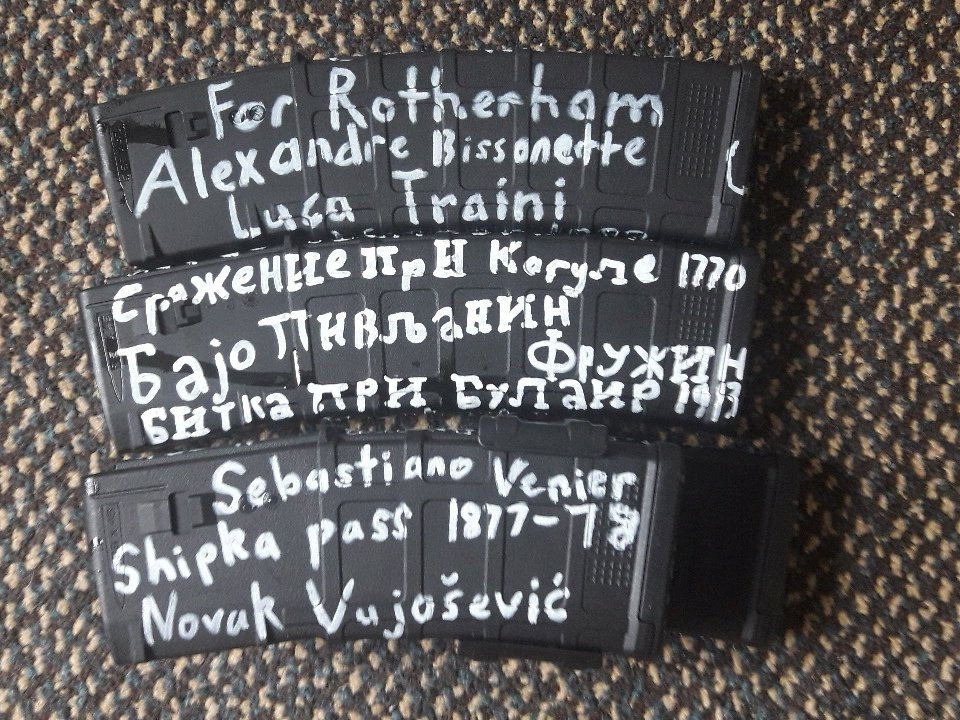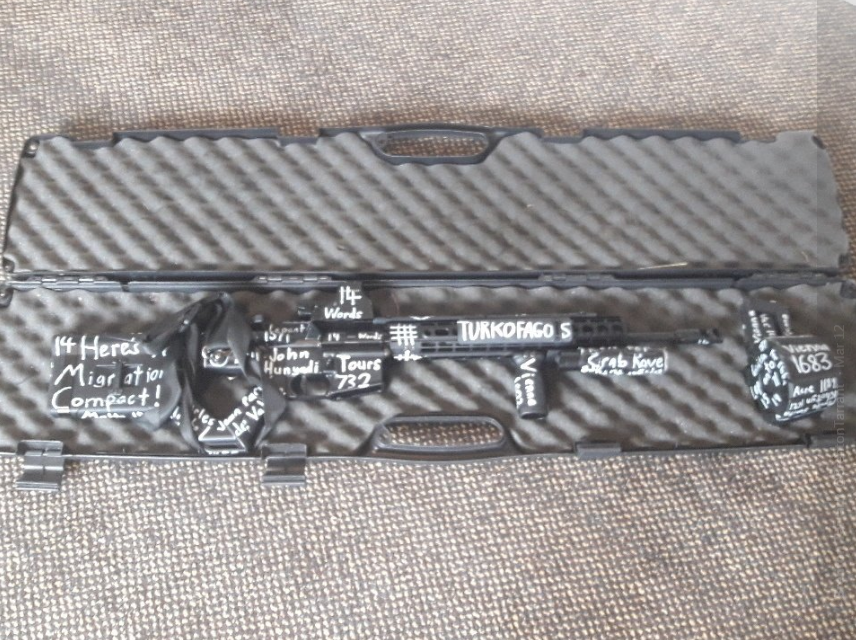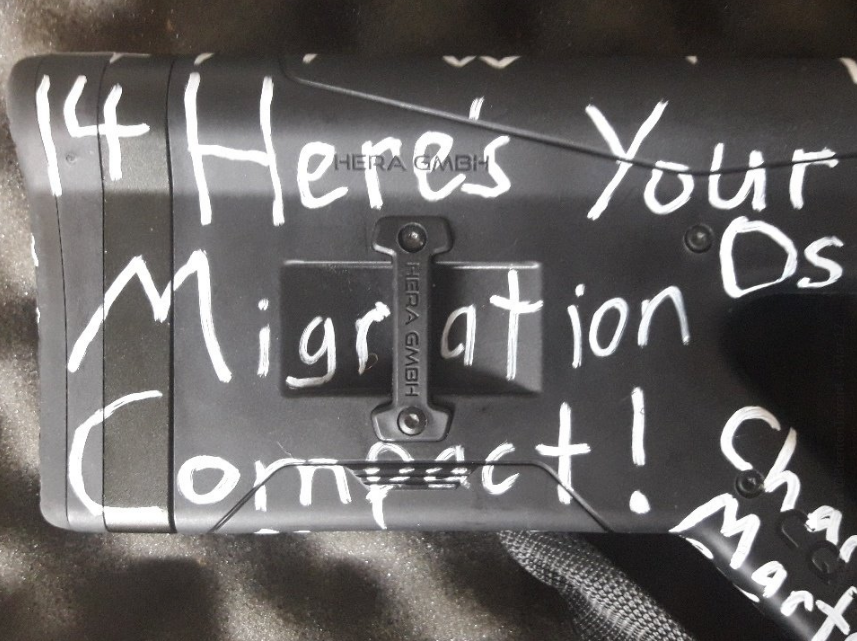The guns and equipment used in the mass killing of 49 Muslims in Christchurch, New Zealand, were decorated with the names of several violent white supremacists, including Canadian mass murderer Alexandre Bissonnette.

The inscriptions also cited several centuries-old victories by Europeans over Islamic forces, as well as the United Nations’ compact on migration, a common target for criticism by white supremacists.
WATCH: Timeline of New Zealand mosque shootings

The names appear to have been written in white paint on the guns used in the attack, which occurred at two mosques in Christchurch on Friday. Both weapons are shown in a bodycam video recorded by the alleged shooter and posted online. It has since been removed.
WATCH BELOW: New Zealand responds to mass shooting at mosque
Several photos the shooter is believed to have posted on Twitter earlier this week show various ammunition cartridges, a rifle and a bulletproof vest decorated in the same white writing. The photos were shared on an account that appeared to belong to the gunman, Reuters reported. Twitter has suspended the account.
The bodycam footage makes it difficult to read the names on the weapons, but the Twitter photos are clear. The equipment is scrawled with the names of several white people who have attacked Muslims, either in recent terror incidents or during the Crusades and other wars against the Ottoman Empire. The suspected gunman’s gear also features several neo-Nazi references, and the names and dates of centuries-old battles in which many Muslims were killed. A handful of other inscriptions refer to more recent incidents involving Muslims.
“For Rotherham, Alexandre Bissonette (sic), Luca Traini,” one cartridge reads.
“Rotherham” appears to refer to a child sex abuse ring that was unearthed in Rotherham, Britain, in 2015. A Pakistani gang was found to have sexually exploited at least 1,400 children between 1997 and 2013 in the small British town.
Bissonnette murdered six worshippers and injured 19 others at a mosque in Quebec City in January 2017. He was sentenced last month to life in prison without the possibility of parole for 40 years, although his lawyers are hoping to shorten that sentence with an appeal.
Bissonette’s name also appears to have been written on the grip of one of the gunman’s rifles, based on still images from the bodycam video.

Get breaking National news
Luca Traini is an Italian neo-Nazi sympathizer who wounded six African migrants in a racially-motivated series of drive-by shootings in Macerata, Italy, on Feb. 3, 2017. Authorities reportedly seized several pieces of Nazi propaganda from his home after his arrest, including a copy of Adolf Hitler’s autobiography, Mein Kampf. Traini was sentenced to 12 years in prison for the attack.

WATCH ABOVE: The mass shootings at two mosques in Christchurch, New Zealand are prompting a conversation around the country’s gun laws, and if they need to change.
The Cyrillic text refers to a 1770 victory by a small Russian army over a much larger Turkish one. Other Cyrillic inscriptions on the gunman’s gear refer to four Serbs who fought against the Ottoman Empire’s occupation of the Balkans.
Sebastiano Venier was a Venetian admiral who won a naval battle against the Ottoman empire in 1571. His name appears at least twice on the suspect’s equipment.
Another photo shows a bulletproof vest decorated with a black sun, or sonnerad. The symbol dates back to the Nordic Vikings of ancient Europe, but it was later appropriated by the Nazis and has since become a symbol of white supremacy, according to the Anti-Defamation League. Neo-Nazis have adopted many Nordic symbols and runes attributed to the ancient Vikings.
The photo also shows dog tags decorated with the Celtic cross, which has been adopted by the white supremacy movement, and another version of the sonnerad.
The suspect’s equipment is also marked with multiple references to “14” or “14 words,” a shorthand for a white supremacist slogan from Hitler’s Mein Kampf. The slogan calls for securing a future “for white children.”
Josue Estebanez is currently serving a 26-year prison sentence in Spain after fatally stabbing a 16-year-old anti-fascist protester in Madrid in 2007. Estebanez was a former soldier.
WATCH BELOW: Witnesses describe the mass shooting in New Zealand
The stock on one of the suspect’s guns is inscribed with the words: “Here’s your migration compact!” This appears to be a reference to the UN’s Global Compact for Safe, Orderly and Regular Migration, a non-binding pact signed by 164 UN nations, including Canada, last December. The pact encourages a set of agreed-upon principles and indicators for governments around the world to follow as they tackle large-scale migration. It also aims to crack down on the often dangerous and illegal movements of migrants across borders.
The compact has become a lightning rod for criticism in many countries, including Canada, the United States and several European nations. It’s also a frequent target for anti-immigrant and white supremacist groups, many of whom complain that it compromises the sovereignty of the countries in the compact.
The agreement does not actually force countries to do anything, and it is not legally binding.
An online manifesto attributed to the suspect refers to many of the same concepts written on his equipment.
He can also be heard listening to a Serbian nationalist song in the attack video. The song glorifies Serbian fighters in the 1992-95 war that tore Yugoslavia apart. It also paints a positive picture of Radovan Karadzic, a Bosnia Serb whom the UN jailed for genocide and other war crimes against Bosnian Muslims.
—With files from The Associated Press

























Comments